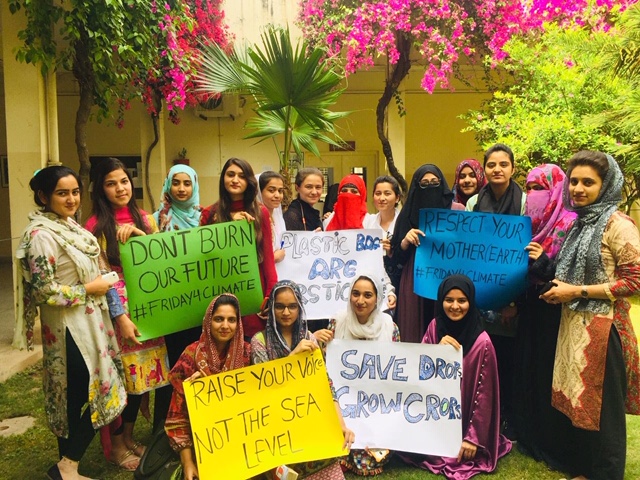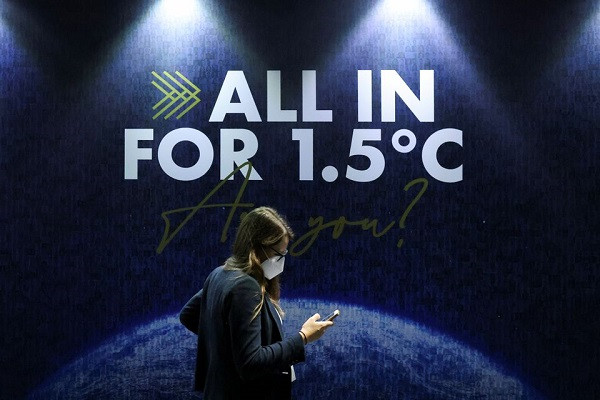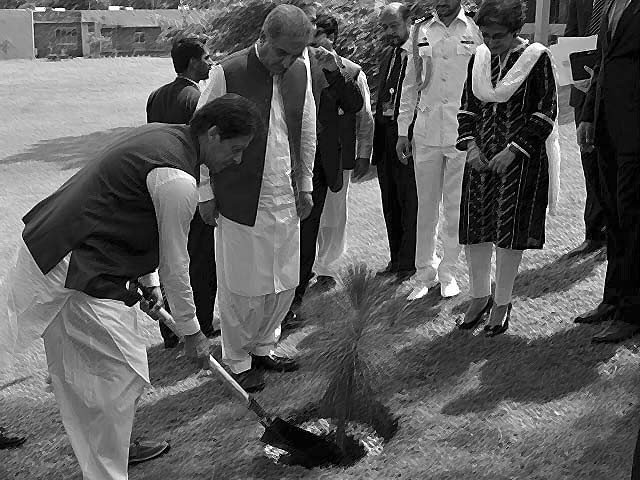
Students who are protesting on Fridays in solidarity with Thunberg’s School Strike for Climate are only restricting themselves to their university campuses in Pakistan. PHOTO: RINA SAEED KHAN
Apart from planting trees, what is Pakistan doing to fight climate change?
Pakistan’s biggest problem is water – either there's too much in the form of floods or too little in form of...
This week, the House of Commons in the UK became the first parliament to declare an 'environment and climate change emergency'. The symbolic move, recognising the urgency to tackle the climate crisis, was largely the result of a mass movement organised by the new group, Extinction Rebellion. This group, led mostly by young people, says that time is running out in order to limit global warming to 1.5C and thus demands that solutions be implemented.
Supporting them is Greta Thunberg, the 16-year-old school girl from Sweden who started the #SchoolStrike4Climate, inspired a global movement and has now been nominated for the Nobel Peace Prize. I met her this past December in Poland, where she was the star of COP24 and spoke at several press conferences. Today the shy schoolgirl has become an international celebrity; the voice of the youth who will grow up and face the terrifying impacts of a rapidly changing climate.

We are in need of a similar movement here, as for now the students who are protesting on Fridays in solidarity with Thunberg’s School Strike for Climate are only restricting themselves to their university campuses in Pakistan. Students are trying to make a difference by protesting, but the movement is yet to make an impact.


In Pakistan, apart from the Billion Tree Tsunami and now the 10 billion trees drive, what exactly is being done about the climate crisis? Especially given that in the Long-Term Climate Risk Index (1998-2017), Pakistan is ranked number eight in the top 10 countries who suffer the most from climate-related disasters.
Yes, our economy is currently in crisis and the government has other issues to worry about, but isn’t Pakistan perpetually reeling from one crisis to another? What our policymakers must understand is that Pakistan, as well as the entire world, is facing converging crises. Not just climate change, but the loss of species, shortages of water and food, population growth, poverty, and so on. The point to remember about climate change is that it will worsen all the other problems and make them harder to solve.

I was thus glad to be invited to the Climate Change Caucus hosted by Senator Sherry Rehman’s Jinnah Institute this week in Islamabad, along with many other parliamentarians, media personnel and concerned citizens.
“Pakistan’s parliament understands the scale and nature of the challenge”, we were told at the opening speech.
However, our parliament is yet to declare it a 'national emergency'. Rehman is on the Senate Committee on Climate Change, which is hoping to lead the charge. She organised the caucus as a ‘public hearing’ of sorts, but unfortunately the public did not get a word in as the mic was passed from one senator to another. Half the senate was in attendance, but from the questions they raised, it was clear climate change is still a new topic for them, confined to issues like planting mangroves in Sindh, protecting Juniper trees in Balochistan and banning plastics (single use plastics have been banned in many parts of the country and will soon be banned in Islamabad as well).
Rehman stated that the senators were keen to learn and contribute, and hopefully they listened to the speakers lined up for the caucus: Malik Amin Aslam, the advisor to the PM on climate change; Patchamuthu Illango, the country director of the World Bank in Pakistan; and Rafay Alam, an environmental lawyer and activist.

Aslam stated that the world is indeed waking up to the climate emergency. He pointed out that at the recent Belt and Road Initiative meeting in China, there was a two-hour long session on climate change as leaders of 30 countries, including Imran Khan, discussed it in detail.
“The world has only 12 years left before climate change can’t be reversed,” stated Aslam. “The special report was a clarion call for the world to act.”
Given our topography, from the glacier-laden mountains of the north sloping down to the Arabian Sea, we are “bearing the brunt of it”. So what is being done about it?
Aslam mentioned the Climate Change Act 2017, which still needs to be implemented. The Climate Change Council has not yet met but has been notified and the Climate Change Authority’s posts are now ready and will be advertised soon. Aslam admitted that,
“It is important to get things going on the ground. Pakistan Tehreek-e-Insaf (PTI) was the first political party to start thinking about climate change (and implemented the Billion Tree Tsunami). The prime minister talked about it in his first address to the nation, so we do want to translate it into action.”
 Malik Amin Aslam addressing the caucus
Malik Amin Aslam addressing the caucusHe also stated that the project concept-one for the 10 billion trees project has now been approved – 50% of the money will come from the federal government and the rest will be contributed by each province. Aside from forests (60% of the project will focus on restoring/protecting existing forests), he said the PTI government would focus on renewable energy. Adaptation efforts include the Indus Recharge project, which aims to restore wetlands across the country so they can store water and protect from super floods.
Agriculture is a neglected area, and according to Aslam,
“Farmers have to get the right information, right seeds and change their cropping patterns.”
However, as Illango pointed out,
“Pakistan needs a whole country approach. Four major crops of Pakistan – sugar, wheat, rice and cotton – take all the water and contribute only 5% to the gross domestic product (GDP). Then there is the end user (of irrigated water) who gets only a trickle of water yet pays the same abiana (water charge) as those farmers who get more. This elite capture of water, the way water is priced, has to change”.
Illango stated that it is environmental sustainability that will determine Pakistan’s future. If we don’t address these environmental challenges right now then not only will our economy be affected, but our quality of life will go down. We also face a population explosion – our growth rate of 2.4% is one of the highest in the region. Our youth bulge can be an asset if mobilised, along with the digitisation of our economy.

For Alam, planting trees is not the solution to the climate crisis. In his view, we have to stop burning carbon, which will also clear up air pollution. Just like the British built the canal system to counter famine in our part of the world, we need a grand plan to protect and adapt. We need to review our National Climate Change Policy that was approved in 2012, long before the Paris Agreement was finalised in 2015 and the new Sustainability Development Goals were formulated.
The Climate Change Act 2017 also needs to be implemented as soon as possible, while provincial governments need to begin their climate vulnerability assessments and think big regarding the future of the Indus Basin. In Alam’s view, the cotton/sugar/wheat mafias who use up all our water have to be dismantled.
“Surely our water can be put to better use?” he asks.
Environmentalists say Pakistan’s biggest problem right now is water – either we have too much in the form of floods or too little in form of droughts. Our inefficient, outdated agricultural practices are using up most of it and making things worse. But who will take on the sugar and cotton barons in parliament? Will Senator Rehman lead the charge?
All photos: Rina Saeed Khan




COMMENTS
Comments are moderated and generally will be posted if they are on-topic and not abusive.
For more information, please see our Comments FAQ